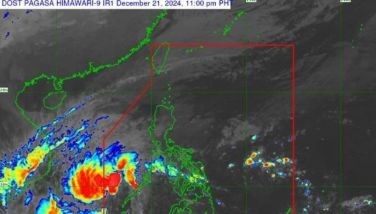'Supermaid' program could worsen Filipino tag as helpers
August 22, 2006 | 12:00am
A city councilor expressed fears that the government's "supermain" program, aimed at upgrading the skills of Filipinos interested to work as domestic helpers, might just exacerbate the definition given to Filipinos as "household servants".
Councilor Edgardo Labella, chairman of the committee on laws, said "the knee-jerk effort to transform our beleaguered OFWs into 'supermaids' seems to remind us of the humiliating effect spurred by a certain western dictionary not too long ago when the same, wittingly or unwittingly, defined a Filipino as a household servant.
Labella said even the Catholic Bishops of the Philippines, through its Episcopal Commission on Migrants and Itinerant People, finds this move of the government as wanting since this reportedly would not address the real needs of Filipino workers.
What Labella is proposing, instead, is for the National Economic Development Authority to create a master plan that would generate more jobs not only to address the country's unemployment problem but also to keep our workers away from the hazards of working in a foreign land especially the Middle East.
Labella said that the experience of our OFWs who were caught in the middle of the war in Lebanon should serve as a wake up call for the government to focus on creating jobs locally. He also said that the "supermaid" concept appears not to be a long-term solution to the country's economic concerns, rather, signifies as an immediate financial solace.
"It should not also be glossed over that the reports of various local and international sources hit that a significant number of OFWs have been victims of abuses ranging from contract substitution, maltreatment, non-payment of salaries, physical beatings, sexual harassment, rape and other similar illegal acts at the job sites," Labella said.
The "supermaid" program is part of the Superpinoy or Skills Upgrading Program for Employment and Re-employment of Pinoys spearheaded by the Technical Education and Skills Development Authority.
The "supermaid" program involves many training modules including first aid and evacuation procedures, personality development, home safety, child care, home management, cooking and caring of pets.
A minimum of 200 hours training earns a worker a National Certificate, making that trainee eligible for a monthly salary of $250 to $350 in US currency. A minimum of 235 hours makes trainee a "supermaid" or grants the trainee a National Certificate II that enables that trainee to earn a monthly salary of $350 to $450. Meanwhile, a minimum of 270 hours of training grants a National Certificate III that entitles a worker the "Household Service Manager/Valet/Governess eligibility, which commands a monthly salary of at least $450. - Joeberth M. Ocao
Councilor Edgardo Labella, chairman of the committee on laws, said "the knee-jerk effort to transform our beleaguered OFWs into 'supermaids' seems to remind us of the humiliating effect spurred by a certain western dictionary not too long ago when the same, wittingly or unwittingly, defined a Filipino as a household servant.
Labella said even the Catholic Bishops of the Philippines, through its Episcopal Commission on Migrants and Itinerant People, finds this move of the government as wanting since this reportedly would not address the real needs of Filipino workers.
What Labella is proposing, instead, is for the National Economic Development Authority to create a master plan that would generate more jobs not only to address the country's unemployment problem but also to keep our workers away from the hazards of working in a foreign land especially the Middle East.
Labella said that the experience of our OFWs who were caught in the middle of the war in Lebanon should serve as a wake up call for the government to focus on creating jobs locally. He also said that the "supermaid" concept appears not to be a long-term solution to the country's economic concerns, rather, signifies as an immediate financial solace.
"It should not also be glossed over that the reports of various local and international sources hit that a significant number of OFWs have been victims of abuses ranging from contract substitution, maltreatment, non-payment of salaries, physical beatings, sexual harassment, rape and other similar illegal acts at the job sites," Labella said.
The "supermaid" program is part of the Superpinoy or Skills Upgrading Program for Employment and Re-employment of Pinoys spearheaded by the Technical Education and Skills Development Authority.
The "supermaid" program involves many training modules including first aid and evacuation procedures, personality development, home safety, child care, home management, cooking and caring of pets.
A minimum of 200 hours training earns a worker a National Certificate, making that trainee eligible for a monthly salary of $250 to $350 in US currency. A minimum of 235 hours makes trainee a "supermaid" or grants the trainee a National Certificate II that enables that trainee to earn a monthly salary of $350 to $450. Meanwhile, a minimum of 270 hours of training grants a National Certificate III that entitles a worker the "Household Service Manager/Valet/Governess eligibility, which commands a monthly salary of at least $450. - Joeberth M. Ocao
BrandSpace Articles
<
>
- Latest
- Trending
Trending
Latest
Trending
Latest
Recommended

















